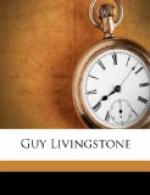You will rarely find the sternest or wisest of men disposed to be harsh toward errors that spring from a devotion to themselves. It is only just, as well as natural, that it should be so. If the second cause of the crime did not find an excuse for the defendant, I don’t know where he or she would look for an advocate. St. Kevin need not have troubled himself: there were plenty of people ready to push poor Kathleen down. I think it is a pity they canonized him.
Through all Guy’s reflections there ran this under-current—“how easily all might have been avoided if the slightest things had turned out differently.” Just so, after a heavy loss at play, a man will keep thinking how he might have won a large stake if he had played one card otherwise, or backed the In instead of the Out. I have heard good judges say that this pertinacious after-thought is the hardest part to bear of all the annoyance. Of course he worries himself about it, just as if “great results from small beginnings” were not the tritest of all truisms. I don’t wish to be historical, or I would reflect how often the Continent has been convulsed by a dish that disagreed with some one, or by a ship that did not start to its time. The Jacobites were very wise in toasting “the little gentleman in black velvet” that raised the fatal mole-hill. Does not the old romance say that an adder starting from a bush brought on the terrible battle in which all the chivalry of England were strewn like leaves around Arthur on Barren Down?
Guy could still hardly realize to himself the certainty of Constance’s approaching death. He tried to fix his thoughts on this till a heavy, listless torpor, like drowsiness, began to steal over him. He roused himself impatiently, and began to think how slow they were going. Nevertheless, the green coteaux that swell between Rouen and the sea were flying past rapidly, and they arrived at Havre, as Mohun had said, just in time to catch the Southampton packet.




